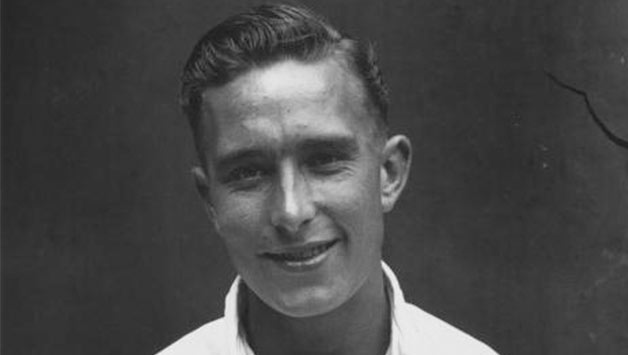
Abhishek Mukherjee
Abhishek Mukherjee is the Chief Editor at CricketCountry. He blogs at ovshake dot blogspot dot com and can be followed on Twitter @ovshake42.
Written by Abhishek Mukherjee
Published: Nov 24, 2015, 10:57 AM (IST)
Edited: Jun 01, 2016, 12:06 PM (IST)


Denis Compton was, as they say, English cricket’s knight in shining armour. However, his First-Class debut — a week after his 18th birthday — was an inauspicious one, where he was demoted to No. 11. His miseries did not end there, for he was given LBW under dubious circumstances by former Derbyshire cricketer-turned-umpire Billy Bestwick. Abhishek Mukherjee recalls a curious incident at Lord’s, no less, on June 1, 1936.
Denis Charles Scott Compton’s childhood was, as he recollected himself, “both poorish and happy.” He grew up with his brother Leslie, who went on to be Denis’ cricket teammate at Middlesex and football teammate at Arsenal. While Denis went on to become a legend in English cricket, Leslie, played football for England. You could rarely ask more from a pair of brothers.
It was a 14-year old Denis’ 114 for Elementary Schools that first caught the eyes of Plum Warner. He led them to a win against CF Tufnell’s XI that day, taking 2 for 5 with his Chinamen after that rollicking hundred. By 16 he was playing for Young Professionals. At 17 he made his debut for Middlesex Second XI. And then, a fortnight after scoring 48 and 45 against Kent Second XI, he made his First-Class debut.
Warming up
Alan Melville, that South African champion, decided to bat against an attack consisting of four Test players — Gubby Allen, Jim Smith, Walter Robins, and Jim Sims. Allen provided some early blows, taking three wickets to reduce Sussex to 60 for 4.
Then James Langridge and Henry Parks got together, adding 74 for the fifth wicket. Both men scored fifties before Langridge was run out and Parks became Compton’s maiden First-Class wicket. Then Smith triggered a collapse, and from 176 for 5 Sussex were bowled out for 185, Allen taking 3 for 61 and Smith 4 for 49.
With Maurice Tate wreaking havoc, Allen held Compton back. Middlesex soon became 48 for 5, Tate taking four of these. Then the bowlers responded, with Nos. 6 to 9 all going past 20. Then, at 162 for 9, Compton, the greatest batsman in the history of Middlesex, walked out at No. 11 to join his captain.
Middlesex trailed by 23. They needed to go past Sussex’s score to get those 5 points.
Compo and the bladder
Compton greeted Allen with the customary “yes, Sir”; Tate bowled a good length, and for some reason, Compton played on the back-foot. The ball just jagged back in and almost brushed the top of middle-stump.
Allen was not amused. After some animated discussion Compton took strike, Tate pitched up, and Compton played back again; once again he survived. It would happen anytime, they thought…
The next ball, to quote Tim Heald from Denis Compton: The Authorized Biography, was “a Tate special which swung in the air like a boomerang.” This time there was no mistake in judgement. Compton later admitted that it was “the most satisfying moment he had experienced.”
Allen and Compton scored those crucial 24 runs to assure a minimum of 5 points. They reached 198 when Jim Parks rapped Compton on the pads. They appealed, Billy Bestwick gave him out, and that was that.
It was just that the decision was a terrible one. Allen was in no mood to accept the decision and protested, but Bestwick came up with a reason that silenced even Allen.
To quote Simon Rae, “The umpire apologised profusely, agreed that Denis was not out but explained that he was dying for a pee and could contain himself no longer. If he hadn’t closed the innings the bladder would have burst.”
It must be remembered here that Bestwick was a First-Class umpire since 1927, and had stood in three Tests between 1929 and 1930. But then, there is not much one can do when Mother Nature takes over…
And thus, Compton’s debut innings came to an end because of a bladder.
What followed?
Sussex batted with confidence, finishing the day on 189 for 3, Langridge holding fort with an unbeaten 83 and Melville 42. Compton had his moment of glory, having Melville caught-behind.
A lead of 176 promised an exciting final day’s play. Unfortunately, that was not to happen, as rain intervened throughout the day.
Footnote
Was it really Bestwick? Tim Heald opened up a new angle in Denis Compton: The Authorised Biography: “When Denis told me the story in 1993 he identified the umpire as Bill Bestwick. Earlier in his autobiographical End of an Innings he wrote that it was Bill Reeves. His memory was often fallible and the incident took place many years before he recalled it to me. Sometimes it is possible to verify such matters from contemporary records; sometimes not.”
Brief scores:
Sussex 185 (James Langridge 53, Henry Parks 50; Gubby Allen 3 for 61, Jim Smith 4 for 49) and 189 for 3 (James Langridge 83*, Alan Melville 42) drew with Middlesex 198 (Maurice Tate 6 for 48).
(Abhishek Mukherjee is the Chief Editor at CricketCountry and CricLife. He blogs here and can be followed on Twitter here.)
This website uses cookies so that we can provide you with the best user experience possible. Cookie information is stored in your browser and performs functions such as recognising you when you return to our website and helping our team to understand which sections of the website you find most interesting and useful.
Strictly Necessary Cookie should be enabled at all times so that we can save your preferences for cookie settings.
If you disable this cookie, we will not be able to save your preferences. This means that every time you visit this website you will need to enable or disable cookies again.
